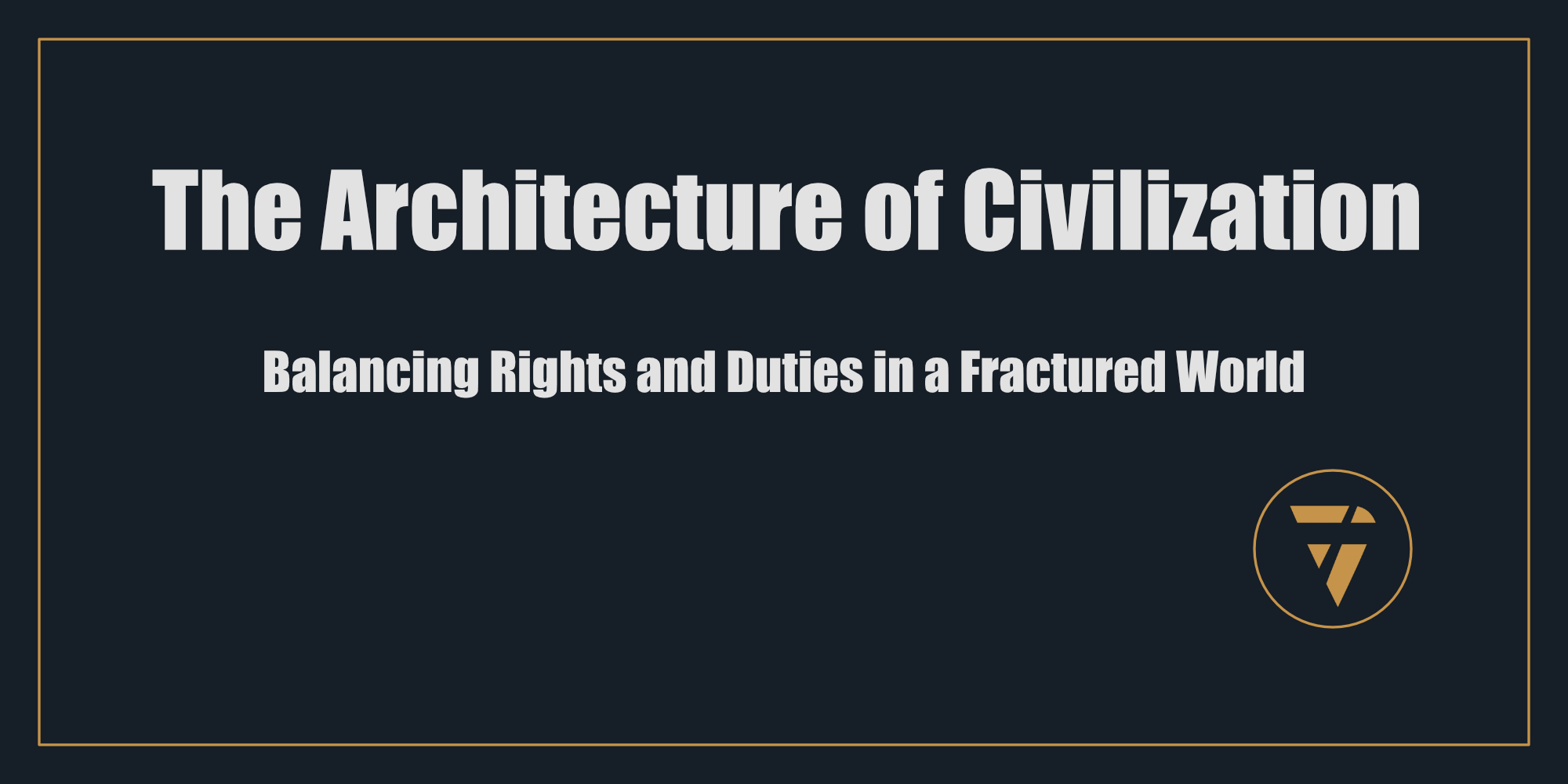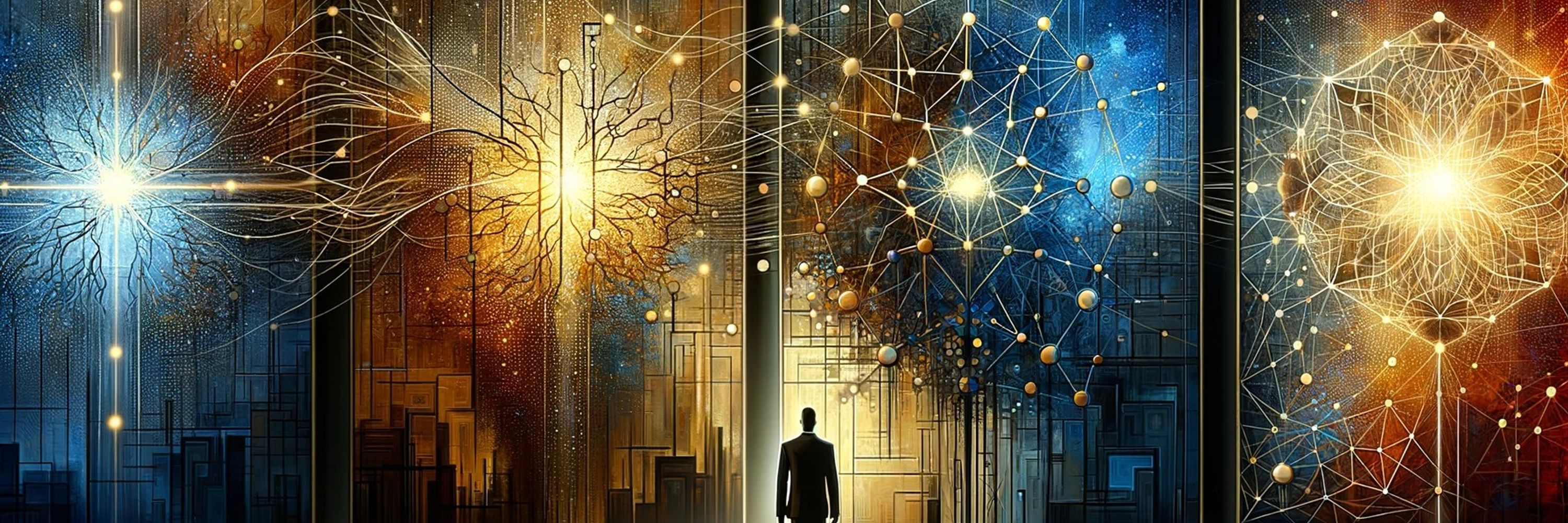The Architecture of Civilization

Balancing Rights and Duties in a Fractured World
There is an unspoken agreement that binds all of civilization - a contract older than any written law, deeper than any constitution. It is not signed in ink, nor enforced by armies, yet it determines the fate of empires, the rise and fall of societies, the flourishing or decay of human life. It is the contract between rights and duties—the delicate equilibrium between what we are owed and what we owe to others.
We live in a world obsessed with rights. We demand them from our governments, from our institutions, from our fellow citizens. The right to life, the right to freedom, the right to security, privacy, opportunity, dignity. And rightfully so—these are the pillars of a just society. Yet, a structure built only on pillars without a foundation will collapse. That foundation is duty—the responsibilities we carry as individuals, as members of a community, as stewards of a civilization we did not create but must sustain.
The fractures in our world today—political polarization, economic inequality, social unrest—are symptoms of a deeper ailment: we have lost the balance between what we take and what we give, between entitlement and obligation, between liberty and accountability. We have built a culture where rights are demanded but duties are neglected, where freedom is cherished but responsibility is despised. And now, we stand at a crossroads: will we repair this imbalance, or will we watch the foundations of civilization crack beneath us?
I. The Twin Pillars of Progress: Rights and Duties Throughout History
The Ancient Origins of Rights and Responsibilities
Long before legal codes and philosophical doctrines, human survival depended on a simple truth: no one exists in isolation. Early hunter-gatherers understood this instinctively—your right to protection from harm was only secured if others upheld their duty to defend the group. Your right to eat was contingent on your duty to hunt, to gather, to contribute. There was no illusion of absolute freedom; survival was a contract between the individual and the tribe.
The first written laws, from the Code of Hammurabi to the Roman Twelve Tables, formalized this contract. They did not frame rights as absolute claims, but as conditions upheld through responsibility. The right to own property was protected because theft was punished. The right to justice was preserved because citizens were obligated to participate in the legal system.
Even the great philosophical traditions—Confucianism, Stoicism, Buddhism, Christianity, Islam—placed duties before rights. Confucius did not begin with "what you deserve" but with "how you should act." The Stoics preached discipline, the early Christians spoke of self-sacrifice, and Islam framed rights as gifts from God, inseparable from ethical obligations.
For most of human history, this balance was understood. It was not questioned. It was the bedrock of civilization.
The Enlightenment: The Shift Toward Individual Rights
The 17th and 18th centuries marked a radical shift. Thinkers like John Locke, Rousseau, and Kant revolutionized political thought by framing human rights as inherent and inalienable. The American and French Revolutions built entire nations on the belief that individuals were born with rights that no king or state could revoke. The rise of democracy, liberalism, and capitalism expanded this idea—emphasizing personal liberty, free markets, and self-determination.
This was a monumental leap forward for humanity. It gave birth to constitutions, civil liberties, and the foundations of modern democracy. But it also marked the beginning of an imbalance—a slow erosion of the equally vital emphasis on duty.
Where once responsibility was seen as a prerequisite for freedom, the modern world increasingly framed freedom as an entitlement independent of responsibility. The social contract weakened. Civic duty declined. The idea of "the common good" became secondary to "individual choice."
And now, we are living through the consequences.
II. The Crisis of the 21st Century: Rights Without Responsibilities
A Culture of Entitlement Without Obligation
Look around the modern world. Everywhere, people demand justice, fairness, and opportunity—but how many ask what they must do to uphold these things?
- We demand democracy but do not vote.
- We demand economic prosperity but refuse to work together to sustain it.
- We demand free speech but ignore the duty to be informed before we speak.
- We demand protection from harm but reject the responsibilities that come with social order.
We have a generation raised on the idea that their rights are sacrosanct but their duties are optional. Social media amplifies grievances, but rarely asks for solutions. Outrage is abundant; accountability is rare.
But civilization does not survive on demands alone. It survives when citizens are willing to be more than recipients of rights—they must be custodians of duty.
The Political Breakdown: Freedom vs. Order
Everywhere, we see the political consequences of this imbalance:
- In authoritarian states, duties are enforced without rights—creating oppression.
- In weak democracies, rights are celebrated without duties—creating instability.
Neither extreme can sustain a nation. Liberty without order leads to chaos. Order without liberty leads to tyranny. The path forward is neither blind obedience nor reckless individualism—it is the return to balance.
The Economic Fracture: Wealth Without Contribution
Capitalism, at its best, rewards effort. But at its worst, it has created a system where wealth can be extracted without contribution. Corporations demand profit without responsibility to the workers who create it. Billionaires demand freedom from taxes without obligation to the society that enabled their success. Consumers demand cheap goods without considering the labour exploitation behind them.
An economy that functions only on entitlement—where everyone wants to take but no one wants to build—cannot last.
The Environmental Reckoning: Consumption Without Stewardship
For centuries, we have exercised our "right" to exploit nature without upholding our duty to protect it. Now, the bill is due. Climate change, biodiversity collapse, poisoned air and water—these are the costs of a civilization that treats consumption as a right but ignores conservation as a duty.
And yet, even in crisis, we see the same imbalance. We demand that governments "fix" the climate while refusing to change our own habits. We protest pollution but keep buying disposable goods. We want solutions without sacrifice.
But there is no solution without responsibility. There never has been.
III. Rebuilding the Social Contract: The Path to a Thriving Future
The way forward is neither in rejecting rights nor in blindly enforcing duties. It is in reconnecting them.
- We must teach responsibility alongside freedom.Schools must educate not just on what students are owed, but what they owe to society. Civics must return as a core subject.
- We must reframe work as contribution, not just income.An economy thrives when people see their labour as essential to the whole, not just as a personal transaction.
- We must redefine citizenship beyond voting.Democracy is more than elections. It is civic engagement, community service, and informed discourse.
- We must embrace sustainable living as duty, not an option.If future generations have a right to a habitable planet, then we have a duty to ensure it.
- We must hold power accountable—corporate, political, and individual.Rights must not be tools of privilege, but be distributed with fairness and justice.
A Call to Action
This is the moment where we choose what kind of civilization we will leave behind. Will we be a society that demands without giving? That claims freedom without earning it? Or will we restore the balance that has sustained humanity for millennia?
The future is not built on what we take. It is built on what we give.
Our rights define our humanity.
Our duties define our legacy.
What will yours be?
This is what I’m working on. Tell me what you think, I enjoy the conversation! Subscribe and follow the work in real time.
Thanks!
B

PS -






